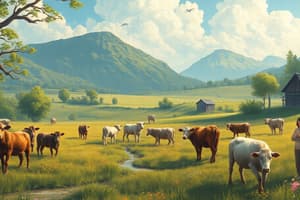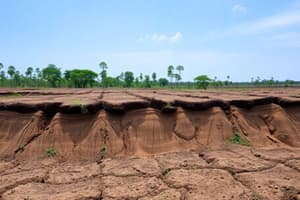Podcast
Questions and Answers
What impact do intensive farming practices have on biodiversity?
What impact do intensive farming practices have on biodiversity?
Intensive farming practices, such as monocultures, reduce biodiversity by limiting the variety of species in an area.
How does habitat destruction contribute to pollution?
How does habitat destruction contribute to pollution?
Habitat destruction, caused by land use for crops and livestock, leads to increased land and water pollution from runoff materials.
What are the greenhouse gas emissions associated with livestock farming?
What are the greenhouse gas emissions associated with livestock farming?
Livestock farming emits greenhouse gases such as carbon dioxide and methane, contributing to climate change.
Describe one method used to conserve fish stocks.
Describe one method used to conserve fish stocks.
What is the role of enzymes like pectinase in biotechnology?
What is the role of enzymes like pectinase in biotechnology?
What are the benefits of genetically modified (GM) herbicide-resistant crops?
What are the benefits of genetically modified (GM) herbicide-resistant crops?
Explain one way biotechnology can improve food safety for lactose-intolerant individuals.
Explain one way biotechnology can improve food safety for lactose-intolerant individuals.
Describe the general process of genetic modification in bacteria.
Describe the general process of genetic modification in bacteria.
Flashcards
Biodiversity
Biodiversity
Refers to the variety of species in an area.
Impact of Farming on Biodiversity
Impact of Farming on Biodiversity
Farming practices like monocultures reduce biodiversity.
Habitat Destruction
Habitat Destruction
Caused by land use for crops, livestock, housing, and resource extraction, leading to land and water pollution.
Pollution and its Impact
Pollution and its Impact
Signup and view all the flashcards
Bacteria in Biotechnology
Bacteria in Biotechnology
Signup and view all the flashcards
Anaerobic Respiration in Biotechnology
Anaerobic Respiration in Biotechnology
Signup and view all the flashcards
Genetic Modification (GM)
Genetic Modification (GM)
Signup and view all the flashcards
Applications of Genetic Modification (GM)
Applications of Genetic Modification (GM)
Signup and view all the flashcards
Study Notes
Impact of Food Production on Biodiversity and Ecosystems
- Intensive farming practices, including machinery, chemical fertilizers, insecticides, herbicides, and selective breeding methods, significantly impact biodiversity.
- Monocultures dramatically reduce the variety of species in an area.
- Intensive livestock farming leads to pollution, high resource consumption, and ethical concerns regarding animal welfare.
Habitat Destruction and Biodiversity Loss
- Land use for crops, livestock, housing, and resource extraction directly results in habitat destruction.
- Deforestation reduces biodiversity, increases soil erosion, and raises carbon dioxide levels in the atmosphere.
- This habitat loss negatively affects various ecosystems and disrupts their delicate balances.
Pollution and Ecosystem Damage
- Agricultural runoff, particularly sewage and fertilizers, depletes oxygen levels in waterways, harming aquatic life.
- Non-biodegradable plastics pose a serious threat to ecosystems and harm wildlife.
- Greenhouse gases, like carbon dioxide and methane, released from fossil fuels, livestock, and rice paddies contribute to climate change and further disrupt ecosystems.
Conservation Efforts
- Conservation efforts are crucial to preserve biodiversity and maintain essential ecosystem functions.
- Strategies for forest conservation include education, establishing protected areas, implementing logging quotas, and reforestation programs.
- Sustainable fishing practices involve controlling fishing quotas, establishing closed seasons, and carefully monitoring fishing methods.
- Protecting species encompasses monitoring habitats, promoting environmental education, establishing captive breeding programs, and creating seed banks.
Biotechnology and Genetic Modification
Bacteria in Biotechnology
- Bacteria have crucial applications in biotechnology due to their rapid reproduction and ability to produce complex molecules.
Anaerobic Respiration
- Yeast, through anaerobic respiration, produces carbon dioxide for processes like bread-making and ethanol for biofuel production.
Enzymes in Biotechnology
- Enzymes like pectinase are used to improve juice production, while biological washing powders contain enzymes to remove stains from clothes.
- Lactase is crucial for breaking down lactose, making dairy products safe for lactose-intolerant individuals.
Fermenters
- Controlled environments, called fermenters, allow bacteria or yeast to create products such as ethanol and insulin.
Genetic Modification (GM)
- Genetic modification involves manipulating an organism's genetic material by removing, altering, or inserting genes.
Applications of GM
- Genetic modification allows bacteria to produce human proteins like insulin and growth hormones.
- Herbicide-resistant crops reduce the need for herbicides, enabling selective weed control.
- Pest-resistant crops decrease pesticide use by making crops less susceptible to insect damage.
- Golden Rice is genetically engineered to contain beta-carotene, addressing vitamin A deficiency.
GM Process
- The GM process involves isolating the desired human gene using restriction enzymes, inserting it into bacterial plasmids, and then reintroducing the modified plasmid into the target organism through DNA ligase.
Controversies
- Genetically modified crops, notably soya, maize, and rice, remain a subject of ongoing debate and discussion.
Studying That Suits You
Use AI to generate personalized quizzes and flashcards to suit your learning preferences.




